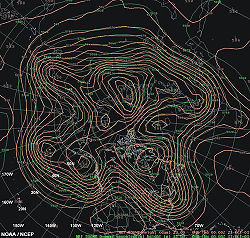
Meridional flow
Encyclopedia

Meteorology
Meteorology is the interdisciplinary scientific study of the atmosphere. Studies in the field stretch back millennia, though significant progress in meteorology did not occur until the 18th century. The 19th century saw breakthroughs occur after observing networks developed across several countries...
term meaning that the general flow pattern is north to south, or south to north, along the Earth's longitude
Longitude
Longitude is a geographic coordinate that specifies the east-west position of a point on the Earth's surface. It is an angular measurement, usually expressed in degrees, minutes and seconds, and denoted by the Greek letter lambda ....
lines (perpendicular to a zonal flow
Zonal flow
Zonal flow is a meteorological term meaning that the general flow pattern is west to east, or east to west, along the Earth's latitude lines . Extratropical cyclones in this environment tend to be weaker, moving faster and producing relatively little impact on local weather.-References:**...
). Extratropical cyclone
Extratropical cyclone
Extratropical cyclones, sometimes called mid-latitude cyclones or wave cyclones, are a group of cyclones defined as synoptic scale low pressure weather systems that occur in the middle latitudes of the Earth having neither tropical nor polar characteristics, and are connected with fronts and...
s in this environment tend to be stronger and move slower. This pattern is responsible for most instances of extreme weather
Extreme weather
Extreme weather includes weather phenomena that are at the extremes of the historical distribution, especially severe or unseasonal weather. The most commonly used definition of extreme weather is based on an event's climatological distribution. Extreme weather occurs only 5% or less of the time...
, as not only are storms stronger in this type of flow regime, but temperatures can reach extremes as well, producing heat wave
Heat wave
A heat wave is a prolonged period of excessively hot weather, which may be accompanied by high humidity. There is no universal definition of a heat wave; the term is relative to the usual weather in the area...
s and cold wave
Cold wave
A cold wave is a weather phenomenon that is distinguished by a cooling of the air. Specifically, as used by the U.S. National Weather Service, a cold wave is a rapid fall in temperature within a 24 hour period requiring substantially increased protection to agriculture, industry, commerce, and...
s depending on the equator
Equator
An equator is the intersection of a sphere's surface with the plane perpendicular to the sphere's axis of rotation and containing the sphere's center of mass....
-ward or poleward direction of the flow.

